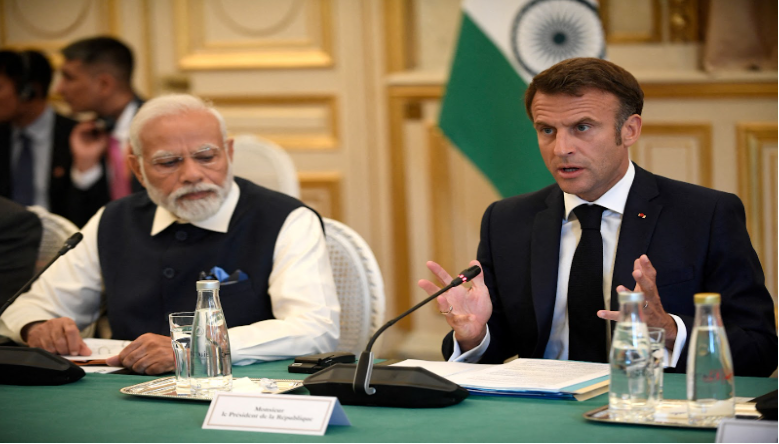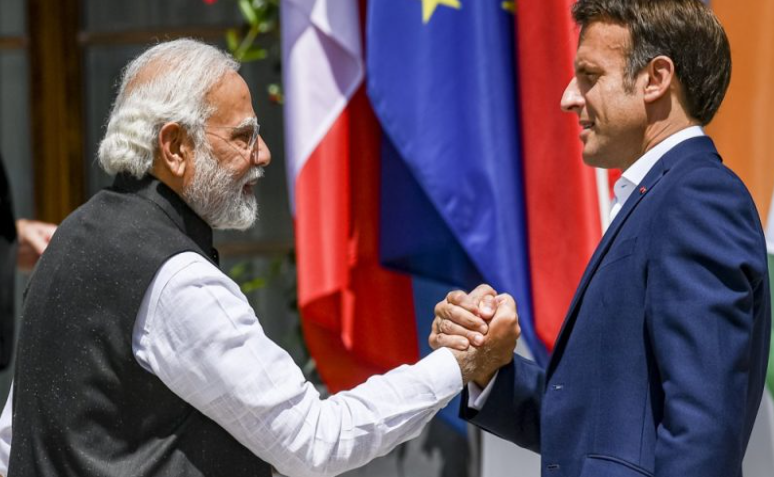
In an era where geopolitical tensions and defense challenges are increasingly complex, nations are revisiting and strengthening their alliances to secure mutual interests. Among the notable partnerships unfolding on the global stage is the alliance between India and France. Known for their shared values of democracy, security, and multilateralism, these two nations have progressively built a strategic relationship, particularly in the defense sector. This relationship, which has expanded over decades, saw a significant boost during French President Emmanuel Macron’s recent visit to India, where he and Indian Prime Minister Narendra Modi signed several landmark agreements aimed at enhancing defense cooperation across multiple domains.

Scope and Significance of the Agreement
Both India and France have been navigating unique security concerns. For India, issues surrounding border conflicts with neighboring countries like China and Pakistan continue to shape its defense priorities. France, on the other hand, has a vested interest in the stability of the Indo-Pacific, where it has overseas territories and increasing defense commitments. With both countries focused on countering rising threats and maintaining regional security, the timing of these recent agreements is crucial. These initiatives are poised to redefine the defense landscape for both nations, strengthening not only military capabilities but also establishing technological and industrial collaborations.
The recent agreements between India and France cover an extensive range of areas in defense, technology, and space. Key highlights include joint production initiatives in military hardware and collaboration in space technology, reflecting a commitment to enhancing both nations’ self-sufficiency and operational readiness. This partnership goes beyond a mere buyer-seller relationship; it represents a strategic collaboration focused on co-developing advanced defense technologies that cater to each country’s specific needs.
Moreover, this agreement introduces the prospect of transferring sensitive aerospace technologies to India. French aerospace firm Safran’s commitment to share full technology for fighter jet engines exemplifies the level of trust and depth of collaboration between the two nations. Such a transfer is rare in the defense industry, underscoring the strategic importance of the India-France alliance.
Strategic Importance of the Indo-Pacific
A critical aspect of the India-France defense partnership is their shared interest in the Indo-Pacific region. As global powers increasingly focus on this region due to its economic and strategic significance, India and France have emerged as proactive stakeholders. France’s territories in the Indian Ocean, including the islands of Réunion, add weight to its presence in the Indo-Pacific, while India’s strategic location gives it a natural advantage in overseeing maritime security. This partnership not only reinforces India’s role as a key player in Indo-Pacific stability but also complements France’s commitment to a free and open Indo-Pacific amid increasing tensions with China.
Expanding Frontiers in Space Cooperation
The India-France partnership also covers advancements in space technology, another vital domain for national security and defense. With the signing of an MoU between India’s New Space India Ltd and France’s Arianespace, the two countries are now set to collaborate on satellite launches and other space-based projects. This partnership aims to enhance intelligence, surveillance, and reconnaissance (ISR) capabilities through the development of military satellites. These satellites are expected to strengthen India’s border surveillance, providing early warnings and detailed monitoring of adversary movements in sensitive areas.
Space cooperation between India and France has been well-established, but the recent agreements elevate the collaboration to a defense-focused partnership. This is especially significant given that the space domain is becoming increasingly contested, with more countries developing military satellites for reconnaissance and even potential offensive capabilities. With shared access to cutting-edge satellite technology, both India and France will benefit from a stronger presence in space, enhancing their situational awareness and overall security framework.
A Future-Oriented Defense Roadmap: Robotics, AI, and Cybersecurity
In addition to tangible military hardware, the defense roadmap between India and France emphasizes collaboration in emerging technologies like robotics, artificial intelligence (AI), and cybersecurity. These domains are crucial for modern warfare, where information dominance and rapid, automated responses can determine operational success. As both nations ramp up their capabilities in these fields, their collaboration will likely extend to areas such as autonomous systems for surveillance and combat, AI-driven analytics for threat detection, and robust cybersecurity measures to protect against digital threats.
Challenges and Considerations
While the India-France defense partnership holds tremendous promise, its success will depend on overcoming several challenges. Establishing manufacturing infrastructure, transferring advanced technology, and ensuring compatibility with existing defense systems are complex processes that require time, investment, and close coordination. Furthermore, the strategic ambitions of both countries must align consistently to adapt to changing global dynamics.
Additionally, the geopolitical implications of this partnership must be managed carefully, as other nations may view it with skepticism. India’s defense relationships with other countries, including the U.S. and Russia, may influence or be influenced by the advancements in its partnership with France. As these projects proceed, maintaining balance and transparency with other defense partners will be essential for sustaining India’s larger network of alliances.
Conclusion: A Resilient, Strategic Alliance for the Future
The defense agreements between India and France signal a new era in their bilateral relations, underscoring a commitment to security, innovation, and regional stability. These partnerships are more than just agreements on paper; they are actionable steps toward a resilient alliance built on trust and shared objectives. By co-developing critical defense technologies and addressing mutual security concerns, India and France are poised to set a global example of a cooperative defense strategy.
The impact of this partnership will extend beyond the immediate objectives of defense production and technological advancement. It will contribute to a strategic framework that upholds regional peace, fosters self-sufficiency and strengthens both nations’ positions as influential players in the global security landscape. With both India and France setting their sights on the future, this alliance will likely evolve further, adapting to new challenges and redefining what a comprehensive, multi-domain defense partnership can achieve in the modern era.




